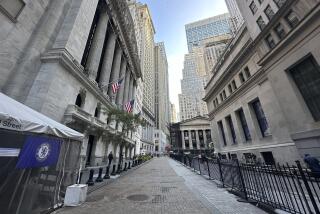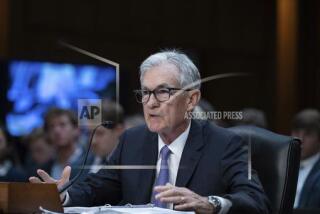Downplaying risk of recession, Yellen indicates an interest rate hike is coming this month
Reporting from Washington — One by one, lawmakers bombarded Federal Reserve Chairwoman Janet L. Yellen with reasons to hold off on raising a key interest rate for the first time in nearly a decade: slow wage growth, the strong dollar, recession fears and recent attacks in Paris and San Bernardino.
Yellen downplayed each one of them Thursday. She didn’t definitively indicate that Fed policymakers would nudge up the benchmark rate when they meet Dec. 15-16, but Yellen solidified the expectations of analysts who now see it as a near certainty.
“It sure sounds to me like she’s seen what she’s looking for” in the recovery, said Gus Faucher, senior economist at PNC Financial Services Group. “If anybody’s surprised the Fed raises rates in two weeks, they haven’t been paying attention.”
SIGN UP for the free California Inc. business newsletter >>
Although Yellen said the U.S. economy has “recovered substantially since the Great Recession,” she acknowledged risks, including slower global growth and outbreaks of domestic or international violence.
But she said one reason to raise the so-called federal funds rate, which affects terms for consumer and business loans, is so the Fed has the flexibility to lower it if those risks cause the economy to falter in the future.
The federal funds rate has been near zero since December 2008 in an attempt to boost economic growth during the Great Recession and its aftermath. The Fed began lowering the rate in 2007 from 5.25% as the economy slowed.
A rate increase “will be a testament … to how far our economy has come in recovering from the effects of the financial crisis and the Great Recession,” Yellen said during a hearing by Congress’ Joint Economic Committee.
“In that sense, it is a day that I expect we all are looking forward to,” she said.
But several lawmakers peppered her with worries about the state of the U.S. economy and concerns that the Fed was moving in a different direction than the European Central Bank, which announced new stimulus measures Thursday.
Sen. Dan Coats (R-Ind.), the committee’s chairman, asked Yellen whether “coordinated terrorist attacks or just an acceleration of the kind of violence we’re seeing — mass shootings and so forth” could have a negative effect on the economy by causing people to hold back on spending or fear going to a mall to shop.
Yellen said the Fed watches those risks “very carefully.”
“I would not say that I see a significant effect at this point, although certainly in the aftermath of the financial crisis, we’ve seen rather cautious behavior on the part of households and firms,” she said.
She promised that the Fed would move cautiously, inching the interest rate up slowly. Some analysts have predicted the Fed could wait as long as six months after the first 0.25 percentage point increase to enact another one.
But Yellen warned that Fed policymakers couldn’t wait too long because there are “well-documented lags in the effect of monetary policy” on the broader economy. The longer the Fed waits, the faster it might have to raise rates, which could harm the economy, she said.
“Such an abrupt tightening would risk disrupting financial markets and perhaps even inadvertently push the economy into a recession,” Yellen said.
She downplayed the short-term risk of a U.S. recession, discounting a Citigroup report this week that there was a 65% chance that would happen next year.
“I can’t put a number on the risk of a recession, but I absolutely wouldn’t see it as anything approaching 65%,” Yellen said.
Based on history, the economy is well past due for a recession after expanding for more than six years. But the sluggish pace of economic growth has helped stave off circumstances, like a housing bubble or overextended consumers, that would trigger a downturn, said Faucher, the economist.
“The flip side of the disappointing recovery means we can continue at this pace for a while longer without creating the conditions for a recession,” he said, putting the risk at 15% next year.
Fed policymakers will look closely at Friday’s job report, the last before their meeting, Yellen said. The report is expected to show solid growth of about 190,000 net new jobs in November — although down from 271,000 the previous month — and the unemployment rate holding steady at 5%.
Wages also are forecast to increase, continuing what Yellen said was “tentative evidence” of a trend that would push low inflation closer to the Fed’s 2% annual target.
But she indicated that a weaker-than-expected report might not be enough to wait on a rate hike.
“We need to be looking at underlying trends in the data and not over-weighting any number,” Yellen said.
Follow @JimPuzzanghera on Twitter
ALSO
Pesticides as bad for kids’ lungs as cigarette smoke, study says
What’s next for leadership at long-struggling Yahoo?
Selling Stardom: Talent scams get short shrift from authorities, actors say
More to Read
Inside the business of entertainment
The Wide Shot brings you news, analysis and insights on everything from streaming wars to production — and what it all means for the future.
You may occasionally receive promotional content from the Los Angeles Times.











